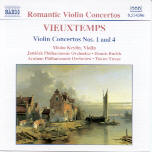Henri Vieuxtemps’ concertos have not aged well. Their banal developments and empty technical passages are packed with all the commonplaces of romantic virtuosity and need very convincing and committed performers to resist the assault of boredom. Vieuxtemps finds in Misha Keylin an ardent defender of his cause, who projects enough warmth and eloquence to sustain the listener’s interest throughout the never-ending Concerto No. 1 (40 minutes!). His admirable precision and intensity of tone equally uphold the D minor concerto, whose four movements are shaped like a symphony, less profuse and more inspired than its lengthy predecessor. The two outer movements don’t always avoid banality, but the sensitive Andante religioso and the effective, witty Scherzo are well worth listening to. Perfectly sustained by two different orchestras and conductors, American violinist (born in St. Petersburg, Russia) Keylin gives every note its due importance, helped in the Fourth Concerto by the magic sonority of his 1715 “Baron Knoop” Stradivarius. The recordings are spacious and agreeable. If you like these works, give the rating another point.
































